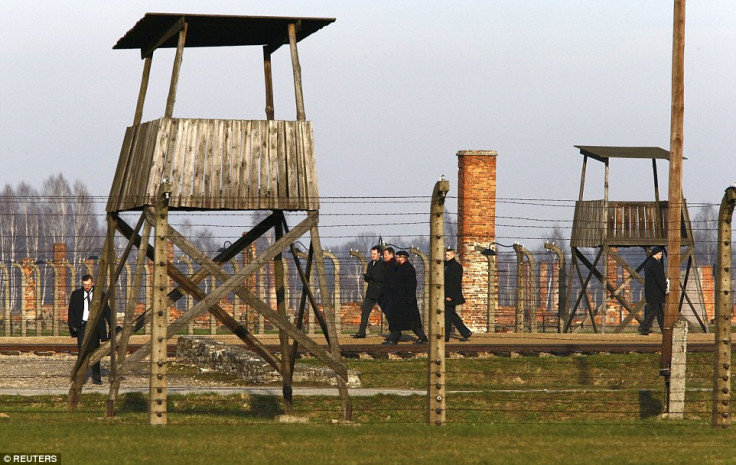PM David Cameron pays tribute to victims of the Holocaust during visit to Auschwitz

David Cameron has paid tribute to the victims of the Holocaust in Poland, on his first visit to the Auschwitz concentration camp.
The Prime Minister had last year pledged to visit the site of Nazi Germany's genocide of European Jews, to see for himself where the "darkest chapter of human history took place."
Lighting a candle in memory of the one and half million victims who died at the camp, he paused in silent reflection.
Writing a personal tribute in a guest book he said: "We must never forget all those who were murdered here. As Elie Wiesel said, failing to remember those who were murdered would be akin to failing them all over again."
We must never forget all those who were murdered here. As Elie Wiesel said, failing to remember those who were murdered would be akin to failing them all over again.
He also paid tribute to the survivors saying: "The survivors here have so much to tell us about what took place. Today they are becoming fewer in number so I hope the Holocaust Commission we have established will teach future generations what took place and that we must never forget all those who were murdered here and at other camps and in other places. We must always remember what happened."
The Prime Minister later visited the neighbouring Birkenau camp where he walked along the train track on which Jewish prisoners were brought to the camp before being imprisoned and gassed to death.
Mick Davis, chairman of the Holocaust Commission, who accompanied Mr Cameron, said: "I was just speaking to the Prime Minister just before he left for the airport, and he said to me that he's looked at all the films and read the books but you just can't understand the scale of what happened - the deprivation that took place, the collapse of humanity.
"Being here was important to the understanding of what took place. You only begin to understand the enormity of the Holocaust and the huge impact on humanity by visiting the camp," he added.
The PM stopped over in Poland after a visit to Turkey, where he met political leaders to discuss the threat from Islamic State militants.
Mr Cameron embarked on the trip with the intention of highlighting the memory of the Holocaust at a time when "anti-Semitism is returning to some parts of Europe."
The Prime Minister announced an increase in government funding for the Holocaust Educational Trust, which takes children and teachers to visit Auschwitz-Birkenau. He also launched a new national Holocaust commission, which will set up a permanent Holocaust memorial in Britain.

Commenting on the PM's visit, Karen Pollock, 'The Holocaust Educational Trust's chief executive, said: "Today the Prime Minister visited the site of the most heinous crime in our shared history. He saw train tracks that brought Jews from across Europe in droves, the crude stables in which they were kept and the gas chambers in which they were ruthlessly murdered."
"Over the last 15 years, with the support of Government funds, we have taken 25000 students and teachers to visit Auschwitz-Birkenau. They come back describing it as life changing. With the 70th anniversary of the liberation of Auschwitz and the end of the Holocaust next year, this visit is fitting and timely."
Around one and a half million men, women and children were killed in Auschwitz during the Nazi occupation from 1940 to 1945. Approximately 1 in 6 Jews killed in the Holocaust died at the camp. Others deported to Auschwitz included 150,000 Poles, 23,000 Romani and Sinti, 15,000 Soviet prisoners of war, 400 Jehovah's Witnesses, homosexuals and anti-Nazi resistance fighters who were also killed at the camp.
January 27, 1945 is commemorated as International Holocaust Remembrance Day and the camp has become a dominant symbol of the Holocaust. In 1947, Poland founded the museum on the site of Auschwitz I and II, and in 1979, it was named a UNESCO World Heritage Site.
© Copyright IBTimes 2025. All rights reserved.






















